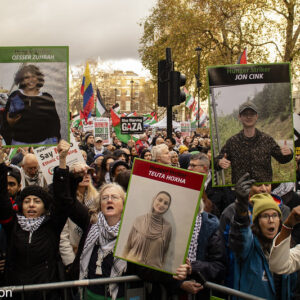Source >> International Viewpoint
The Popular Party also accumulated electoral power winning many provincial capitals (Valladolid, Zaragoza, Valencia, all the Andalusian ones, except Jaén…) and consolidating its stronghold in Madrid. Vox was consolidated as a state political force. The governmental left is sinking, with Podemos disappearing in Madrid, the Canary Islands and the Valencian Community and becoming a residual party in the territories; Ada Colau lost Barcelona city council. The radical left, like the Candidatura d’Unitat Popular – CUP or Popular Unity Candidacy – and Adelante Andalucía, have fared no better in these elections: the former lost 40,000 votes and turned into a party of the Catalan peoples, Adelante Andalucía lost Cádiz and is no longer in key cities such as Jerez or Seville. Only the Bloque Nacionalista Galego – BNG or Galician Nationalist Bloc – and EH Bildu improved their results in Galicia and Euskal Herria, while Más Madrid managed to remain the leading opposition force to Ayuso and Almeida. This is, in a descriptive way, the political panorama that has led Pedro Sánchez to call elections for 23 July.
From transformism to restoration
These results can be read as a shift to the right. In the field of institutional power and the political environment, they certainly are. However, Pedro Sánchez’s manoeuvre is an attempt to avoid the wear and tear of months on the defensive, with an emboldened Partido Popular –PP or People’s Party – and pressure from Ciudadanos – Citizens – and a left of the government that, through the umpteenth attempt to refound itself around Yolanda Díaz , was trying to surf what by all accounts is already a deep crisis. Many analysts have insisted that Pedro Sánchez is betting everything on one last chance to win, with his usual style of playing poker. It is possible that the maths plays out: there is a possibility that it will be a close election. But the truth is that the turn to the right of Spanish society cannot be ignored. As much as Pedro Sánchez tries to save himself (we’ll see if he succeeds), the right is experiencing an ascendant phase and the left a process of decline, with clear symptoms of decomposition of some of Sánchez agents, as is the case of Podemos.
There are, without a doubt, international causes that determine Spanish politics and its state of mind. The post-pandemic and war society is an exhausted society, in search of security in a context in which, after the collapse and capitulation of the left-wing options that emerged in 2008, change is felt as something that can bring us closer to a country of the capitalist periphery than like Sweden. This state of mind, present throughout the capitalist centre, provokes a strong hegemony by the old middle classes and the reactionary right, who seek to unload the weight of the crisis on the working class. But the central issue is that the progressive government has done nothing to strengthen the working class throughout these years of government. The policy of social peace and agreement with the employers has meant a decrease in wages without affecting benefits and the relationship of forces between the classes remains exactly the same. The progressive left believes that its problem is fundamentally communicative, but the problem is deeper: it is incapable of transforming anything substantially, because it lacks the will and social strength to do so. Its project is that of capitalist modernisation and keeping Spain in the club of the declining imperial periphery. Even if Pedro Sánchez got lucky and had the numbers to be in government, the restoration led by the right would already be underway. The left of the government, already touched and half sunk after these elections, will seek to endure in the midst of their disputes over positions and fights on social networks – all without making the slightest strategic analysis of the effects of their integration into the regime. Tied hand and foot to the progressive bloc, its social attrition, no matter what happens in the next elections, is already unstoppable. In the medium term, this will translate into new crises and implosion processes.
Two scenarios and one perspective
In the most unlikely, but not ruled out, scenario, the progressive government would repeat its mandate. We say that it cannot be ruled out, because the electoral arithmetic indicates this, even though the political dynamics go in the opposite direction. The government would continue its modernising policy for a while, preparing for the EU directives (little debated in our secondary-obsessed public sphere) announcing spending cuts in the name of the deficit, redistributing European funds, increasing military spending and boosting the wage freeze via agreements between employers and unions. There is no other horizon: stop the right, in order to continue with the same policies as always.
In the event that the right wins, the first dilemma would be the entry of Vox into the government. But it is important to note that this would not mean a regime change. Some of the weak measures taken by the government would be repealed: others would stay. Political repression of the militant left would undoubtedly increase in degree, with the gag law that the progressive government has not repealed. The most novel thing would be the exclusion of the big unions from the social agreement. But social dynamics are not like a fountain that turns on and off: against a demoralised and exhausted left, the opposition would play the classic role of an aspiring turnista. The PSOE would lead the opposition, and the so-called PSOE left would accelerate its Italian-style crisis.
Neither the social nor trade-union movements nor the eco-socialist and anti-capitalist left, in a broad sense, that oppose this progressive government should consider this second scenario positive. In the first place, because it would not mean any attrition on the left of this government, but rather a turn to the right that would redouble the attacks on the working class. Secondly, because the conditions of political freedom (without having to talk nonsense about fascism) would worsen considerably. Thirdly, because it takes time for fractions of the working class to break away from the progressive bloc, through a clearly disappointing government experience. This does not mean endorsing the logic of the lesser evil or submitting to the blackmail of some progressive parties, which are primarily responsible for this situation. The fundamental thing is to rearm for what is to come and try to understand why this cycle of restoration has been opened without repeating the same mistakes. The construction of an eco-socialist and anti-capitalist political project will not face the same scenarios if the progressive bloc or the right governs, but the important thing, whatever happens, is that we do not stop working to open another perspective.
I don’t think it makes much sense to get involved in debates about the vote where there are no left-wing options that are outside the progressive government bloc. The calls for abstention have more to do with the self-construction of the group (any militant of a revolutionary left group that has a real presence somewhere outside the internet knows that a PP-Vox government will increase the political repression they suffer). Abstention in this specific context implies, for the most part, disaffection and political apathy. This is something that could become anger in the future: this is central, but to be serious, this social sector, key to future yellow vest-style outbreaks, will not determine its political action by anyone’s position right now. In the same way, the blackmailing logic that forces anyone opposed to a right-wing government to become a vote-collecting adherent, despising militant construction and the need for a project of rupture, is intolerable. Let progressivism earn its own votes and exhaust its path as far as it can. Those of us who are committed to another path, based on class conflict, even though today it is a minority one, must prepare ourselves for the challenges that come, seeking a coming together with all the emancipatory movements and putting at its centre a strategy of accumulating forces to overthrow this political regime. We must also be capable of putting together a social and political defence against the attacks that are coming. A major challenge, but in the twilight of progressivism, it is the only way to sow the seeds of another future.
Translated by David Fagan for International Viewpoint from Viento sur.
Art (54) Book Review (127) Books (114) Capitalism (68) China (81) Climate Emergency (99) Conservative Government (90) Conservative Party (45) COVID-19 (46) EcoSocialism (60) Elections (83) Europe (46) Fascism (62) Film (48) Film Review (68) France (72) Gaza (62) Imperialism (101) Israel (129) Italy (46) Keir Starmer (56) Labour Party (113) Long Read (42) Marxism (49) Marxist Theory (47) Palestine (182) pandemic (78) Protest (153) Russia (343) Solidarity (150) Statement (50) Trade Unionism (144) Ukraine (351) United States of America (139) War (370)
The Anti*Capitalist Resistance Editorial Board may not always agree with all of the content we repost but feel it is important to give left voices a platform and develop a space for comradely debate and disagreement.
Latest articles
- Palestine hunger strikes paused: It was love, not hate, that called me‘I want to make it abundantly clear that this is not about dying, because unlike the enemy, I love life, and my love for life, for people, is the reason why I have been incarcerated.’ ’These are the words of Heba Muraisi, the longest running hunger striker in Britain since the 1980s explains Caterina Teodoroiu.
- Prison, philosophy, familyDave Kellaway reviews Waiting for the Out currently on BBC and Iplayer
- Tories sack JenrickSimon Pearson reflects on the continuing death spiral of the Conservative Party
- Demands Met on 73rd Day as Three End StrikePrisoners for Palestine report on the end of the hunger strikes for some of the prisoners being held at Balfour.
- From the Ashes of the Arab SpringToday marks 15 years since the overthrow of Tunisian dictator Ben Ali, one of the high points of the Arab Spring. The events of 2011 gave rise to an impressive wave of revolutions. Almost all were bloodily suppressed. Jean Batou interviews Gilbert Achcar.






